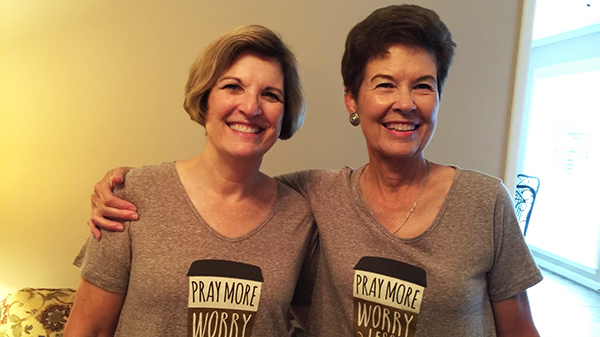The painting by artist Norman Rockwell of a festive family sitting around a holiday table laden with food may be an accurate image for many families.
However, for those who have had a loss to death — that of a spouse, parent, grandparent, child or sibling — the holidays are anything but festive and happy.
A joyous time of year for many is, for the bereaved, a season when pain is magnified and loneliness accentuated as they face the prospect of a holiday without their loved one.
Yet, holiday hurt can be eased and softened. Here are 20 ways to cope when you are grieving.
1. Think it through. Be very intentional about how you will celebrate the holiday. Will you keep the same patterns as in previous years or will you change traditions completely? By planning ahead you will have a better grasp of what you will want to do and what you will not want to do. Remember there is no right or wrong way to celebrate.
2. Share your feelings with the family. Let others in the family understand how you feel the holiday could be best celebrated. Don’t expect them to be mind readers. Communicate your needs. Most family members want to celebrate the holiday in ways that are most helpful to the person grieving the hardest.
3. Listen to your heart. Remind yourself you can change your mind about holiday celebrations. If earlier decisions don’t feel right as the time approaches, then don’t follow through or make the necessary adjustments. Follow the leading of your heart.
4. Shop creatively. If being in a mall with festive crowds is too depressing for you, consider other alternatives. Make your holiday purchases via catalogs, phone orders or the Internet.
5. Seek God in the midst of your pain. The Bible makes clear that God is always present to sustain us, to strengthen us, and to bring new understanding to us. Consider these verses as you seek God: “Give your burdens to the Lord, and he will take care of you” (Ps. 55:22, New Living Translation). “Through each day the Lord pours His unfailing love upon me” (Ps. 42:8). “I will be your God throughout your lifetime. … I made you and I will care for you. I will carry you along and save you” (Isa. 46:4).
6. Be gentle with yourself. Allow yourself the freedom not to live up to the expectation of others. “The family and I always attended a midnight Christmas Eve service,” says a grieving mother whose daughter died from an auto accident in the fall. “I just couldn’t bear to be in that service without Terri so I gave myself permission to stay away from that service and, instead, attend the earlier service at our church. While some family members preferred for us all to be together at the midnight service I felt it would be all right if I did not please everyone.”
7. Change what needs to be changed. “Every year my husband and I pull out a huge box containing an artificial tree which we had used for nearly 25 years. However, the holiday after Al died, I couldn’t bear to do that,” says his wife. “Instead, I found it comforting to go out and buy a live tree and decorate it. That live tree reminded me that life was still flowing in our family. We had wonderful children, terrific sons and daughters-in-law as well as four delightful grandchildren.”
8. Talk about the loss. Let your pain spill over into words. Share your feelings with a trusted friend and you will feel better. Be guided by Shakespeare’s wisdom: “Give sorrow words; the grief that does not speak/Whispers the o’er fraught heart and bids it break.”
9. Guard your health. “Eat a balanced diet. Get some exercise. Try your best to take good care of yourself. Remember: Neglecting your health does not honor the memory of your loved one,” writes Rabbi Earl Grollman in his book “Living With Loss, Healing With Hope.”
10. Be tolerant of your limits. Grieving is hard work and takes its toll emotionally, mentally and physically. Don’t overextend yourself. Eliminate stresses and strains when you can. “The first year after Don died, I just didn’t have the energy to address and mail out the 300 Christmas cards we normally sent,” remembers one widow. “So, I cut down the list and sent cards only to some 80 people, all of whom lived in other parts of the country and were people I would not be seeing. Since most of them did not know of Don’s death I used the card as an occasion to let them know.”
11. Spend time with supportive people. Not every one understands the pain of grief. Identify people in whose company you feel better. Then spend more time with them during the holidays. The power of friendship is commended in Scripture: “Two people can accomplish more than twice as much as one. … If one person falls, the other can reach out and help. But people who are alone when they fall are in real trouble” (Eccles. 4:9–10).
12. Talk about your deceased loved one. Often a family will engage in a conspiracy of silence believing you will be better served if no one brings up your deceased loved one. Most grievers find such silence only adds to their pain and confusion. Include the deceased person’s name in your holiday conversations. As you speak candidly about him or her others will recognize your need to remember that special individual and will also talk about that person.
13. Help others. Take the focus off your pain and your troubles by investing yourself by helping others. Volunteer at a downtown mission, feed the hungry, visit a lonely person, invite someone who is alone to share a meal with you.
14. Let your tears flow. There is no doubt that the holidays will be an emotional time. When you feel the need to cry, let the tears flow. You’ve lost someone you love and crying is a perfectly normal response to the loss. Tears are an honest expression of grief.
15. Memorialize your loved one during the holiday. Consider sending a donation to a cause or an organization which was important to your loved one. Making a contribution is an effective way to both honor the memory of your loved one and to continue his or her commitment.
16. Join a grief support group. “Joining or re-entering a support group may be the single most important step you can take as you struggle with grief during the holidays,” says Kenneth J. Doka, an author and grief educator. “Support groups provide members with the opportunity to share the pain of grief with others who are also finding the holidays a struggle.”
17. Embrace your treasure of memories. “Memories are one of the best legacies that exist after the death of someone loved,” notes Alan D. Wolfelt, director of the Center for Loss and Life Transition in Fort Collins, Colo. “And holidays always make you think about times past. Instead of ignoring these memories, share them with your family and friends. Keep in mind that memories are tinged with both happiness and sadness. If your memories bring laughter, smile. If your memories bring sadness, then it’s all right to cry. Memories that were made in love — no one can ever take them away from you.”
18. Meditate. Many find this a very easy and calming way to deal with holiday grief. Simply find a comfortable place to sit either on the floor, in a chair, on a sofa. Close your eyes and focus on your breathing. As you inhale and exhale slowly, repeat a phrase you find comforting. “I found a 10-minute daily meditation to be tremendously strengthening,” recalls one widow. “As I breathed in I repeated a faith statement, ‘God loves me.’”
19. Create a special holiday tribute for your loved one. Some ways to do this include: lighting a special candle each evening; putting together a bowl of colorful ornaments and placing them in a visible location in your home; reciting a daily prayer expressing gratitude for the gift of your loved one; creating a picture display of your loved one on a small table.
20. Finally, choose life in every way you can. Be among people who vitalize and energize you. Practice disciplines that bring you hope, peace, comfort, joy, love. Engage in activities that bring you meaning and satisfaction.
Grief over lost loved ones can turn joyous occasion into painful, lonely time
Related Posts

Fresh grief ushers in different kind of Christmas for Debbie
December 15, 2020
Note from Editor Jennifer Davis Rash — So many of you have experienced the life and joy Debbie Campbell brings

Sensitivity, comfort from Scripture help the hurting during difficult season
December 15, 2020
Walking into the store, the automated greeting Santa states, “Ho, Ho, Ho, Merry Christmas” and waves with his white-gloved hand.

Alzheimer’s, dementia: Pastor shares lessons learned
August 12, 2019
As a minister for more than 40 years, Mike Glenn walked through the valley of dementia and Alzheimer’s disease with
God can handle questions, doubts, Barrett says
May 26, 2016
Some of the most joyful words ever spoken are those announcing a pregnancy. The words invite hugs, pats on the

Share with others: